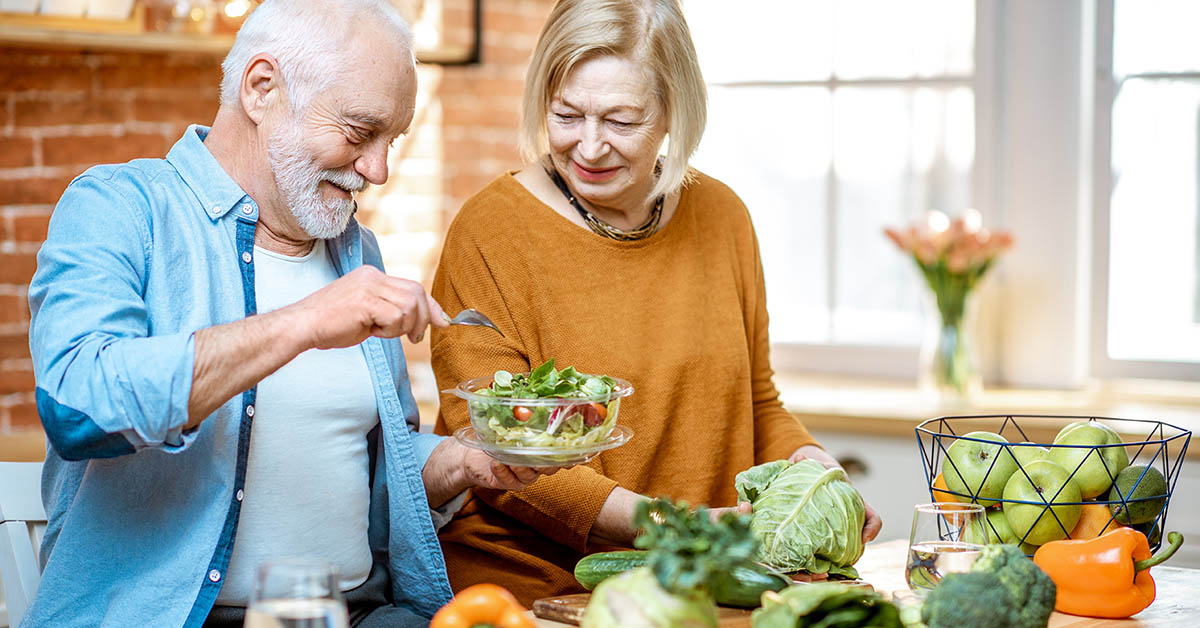
Why is it so important for seniors to maintain a healthy diet?
Truth be told, taking care of our bodies should be a priority at any age. That said, maintaining a healthy weight is especially important for those over the age of 65, as our bodies naturally become less resilient as we get older. When it comes to senior health, however, proper nutrition is always more important than losing weight via exercise by itself.
If you are over the age of 65, make sure that you are getting enough calories and essential nutrients through a healthy senior diet. This way, you’ll have the confidence of knowing that your body is still capable of carrying you through your golden years.
Learn more about the importance of healthy eating for senior men and senior women right here at Nursing Home Reviews.
What age-related challenges might hinder proper senior nutrition?
A healthy diet is absolutely essential for a happy, healthy life. As we age, we become more susceptible to disease and disability. According to the World Health Organization (WHO), a majority of these complications arise from a lack of proper senior nutrition.
The following are a few age-related challenges that you may face as you get older, all of which hinder your body’s ability to properly fuel up and function properly:

Decreased Sensitivity
The older you get, the less tuned your body’s senses become, making it more challenging and more energy-consuming for your brain to trigger a response. This decreased sensitivity can directly affect your appetite as well, potentially preventing your body from getting the nutrients it needs. For example, you may begin to have trouble distinguishing fresh food from stale, or your sense of smell and taste may be dull, reducing your desire for certain foods.
Side Effects of Prescription Medications
Certain medications can directly affect the way your body absorbs nutrients and may carry side effects that reduce your appetite. Often, these side effects include nausea and change in food taste perception. After a while, this may cause you to skip meals and discourage you from eating.
Dental Health Issues
The older you are, the more likely you are to develop problems with your teeth. These issues can sometimes include things like missing teeth, receding gums, and mouth or jaw soreness. Over time, these factors may make chewing more painful and reduce the likelihood that you will consume a diverse range of healthy foods.
Financial Troubles
Older individuals are often on a fixed income. As a result, they may have limited resources available for groceries, causing them to purchase cheaper, less nutritious food options. Naturally, this habit can lead to an increase in nutritional deficiency.
Problems with Transportation
Older people sometimes give up driving when it becomes more challenging as a result of age. In order to purchase fresh ingredients, reliable transportation is often a necessity. In the rain or snow, buying and transporting food can become even more difficult. This may make you less likely to venture out for fresh groceries frequently. Luckily, there may be options available for you for food delivery that are worth looking into.
Physical and Mental Limitations
As we grow older, a lot of physical, mental, and emotional changes may occur. Unfortunately, older individuals are much more likely to struggle with mental and emotional problems like memory loss, dementia, Alzheimer’s, or depression.
Furthermore, physical issues resulting from arthritis or disability can make even the simplest tasks seem insurmountable. Therefore, tasks that were once second nature, like standing for long periods of time while cooking or carrying in grocery bags, are now practically impossible.
Because such issues are so common among older adults, maintaining a healthy diet over the age of 65 can feel impossible. For this reason, knowing which food choices are best for people your age (and how to access them) is especially important.
What are some healthy food choices for seniors?
When considering which food choices are best for your age and lifestyle, it can often be beneficial to start with the basics. That means eating balanced meals or following an organized elderly nutrition program, which typically includes foods that are rich in the following key nutrients:

Omega-3 Fatty Acids
Omega-3 fatty acids, which can be found in meals containing fish, like salmon, sardines and tuna, seeds and nuts like walnuts and flaxseed, and other foods like avocado, soybeans, and canola oil, are especially important to diets for seniors.
These foods have been known to lower your risk of cancer, heart disease, and even cognitive decline. For this reason, nutritionists recommend consuming a serving of omega-3 fatty acids at least twice a week.
Fiber
One slightly unpleasant fact about aging is that it can often disrupt our body’s ability to digest efficiently, as the walls of the gastrointestinal tract thicken, slowing contractions and possibly leading to constipation.
High-fiber foods, like whole grain pasta and bread, nuts, and natural fruits and vegetables can make a huge difference when it comes to keeping our digestive system in shape and lowering the risk of digestive conditions.
Calcium
Calcium is a primary element of strong and healthy bones. In addition, recent studies have shown that slightly increasing calcium intake can also lower blood pressure. Unfortunately, many people often consume less calcium as they age.
Dairy products, like milk, yogurt, and cheese; as well as leafy greens, are high in calcium. As a result, the WHO recommends people above the age of 50 years old consume 1200 mg of calcium per day.
Iron
Iron plays a pivotal role in our bodies. It is mainly responsible for the production of hemoglobin, which carries oxygen from the lungs into the blood and throughout the rest of the body.
Iron deficiency means that your body has only a limited supply of oxygen for its various body tissues, resulting in fatigue and lethargy. You can prevent this issue by consuming high-iron foods like beans, broccoli, spinach, poultry, and red meat (though red meats should be consumed in moderation).
Vitamins C, D, and B12
Vitamins C, D, and B12 are especially important for senior nutrition, as they contain antioxidants that keep you looking, feeling, and thinking young. Vitamin C aids in the production of collagen, which helps maintain skin elasticity, while Vitamin B12 is responsible for maintaining proper nerve function. Vitamin D aids in the absorption of calcium.
Foods high in Vitamin C include vegetables like peppers, kale, broccoli, and brussels sprouts, fruits like kiwi, lemons, and strawberries, and herbs like parsley and thyme. Vitamin D is found in dairy products, as well as mushrooms and some fortified cereals Vitamin B12 can be found in organ meats like liver and kidneys, eggs, fish, and shellfish.
If you find it difficult to consume healthy amounts of these vitamins from your natural diet, supplements are often available from your doctor as well.
Potassium
Potassium aids in basic cell functions, reduces blood pressure, and lowers your chances of developing kidney stones. It can often be found in fruits like bananas, prunes, and potatoes.
Note that over-consumption of potassium can also be dangerous, so be sure to consult your doctor for a full run-down of your specific dietary needs.
Magnesium
Over 300 of your body’s crucial physiological functions rely on magnesium to operate efficiently. Not only does this element keep your heart and your immune system healthy, but it has also been known to strengthen bones.
As we grow older, our body’s natural ability to absorb magnesium decreases. In addition, some medications have been known to decrease magnesium absorption as well. To combat this, try mixing in some high-magnesium foods such as whole grains, nuts, fresh fruits and vegetables.
Water
There are few things more important to the proper functioning of the human body than good old-fashioned water. As you get older, your body’s ability to conserve water decreases significantly, causing your thirst to diminish. Even so, your body still needs water.
Dehydration is extremely dangerous, and can even lead to confusion, drowsiness, and irritability. For this reason, professional researchers recommend drinking between 11.5 and 15.5 cups (2.7 to 3.7 liters) of water per day.
There are exceptions to this rule for those affected by kidney and liver disorders. Be sure to consult your doctor regarding the ideal amount of water you should be consuming each day.
How can I ensure my diet is properly maintained to the best of my ability?
It’s no secret that living on our own as we get older can be especially challenging, especially when it comes to eating the best diet foods for seniors. If living on your own is becoming too much to manage, there is no shame in considering a move to a high-quality retirement community, nursing home, or assisted living facility.
At Nursing Home Reviews, we strive to help seniors research and compare the best possible nursing homes for their specific needs. Consider signing up for an account today to begin reading facility reviews, compiling a list of your favorite options, and uncovering any possible violations that may be relevant. We look forward to assisting you!





